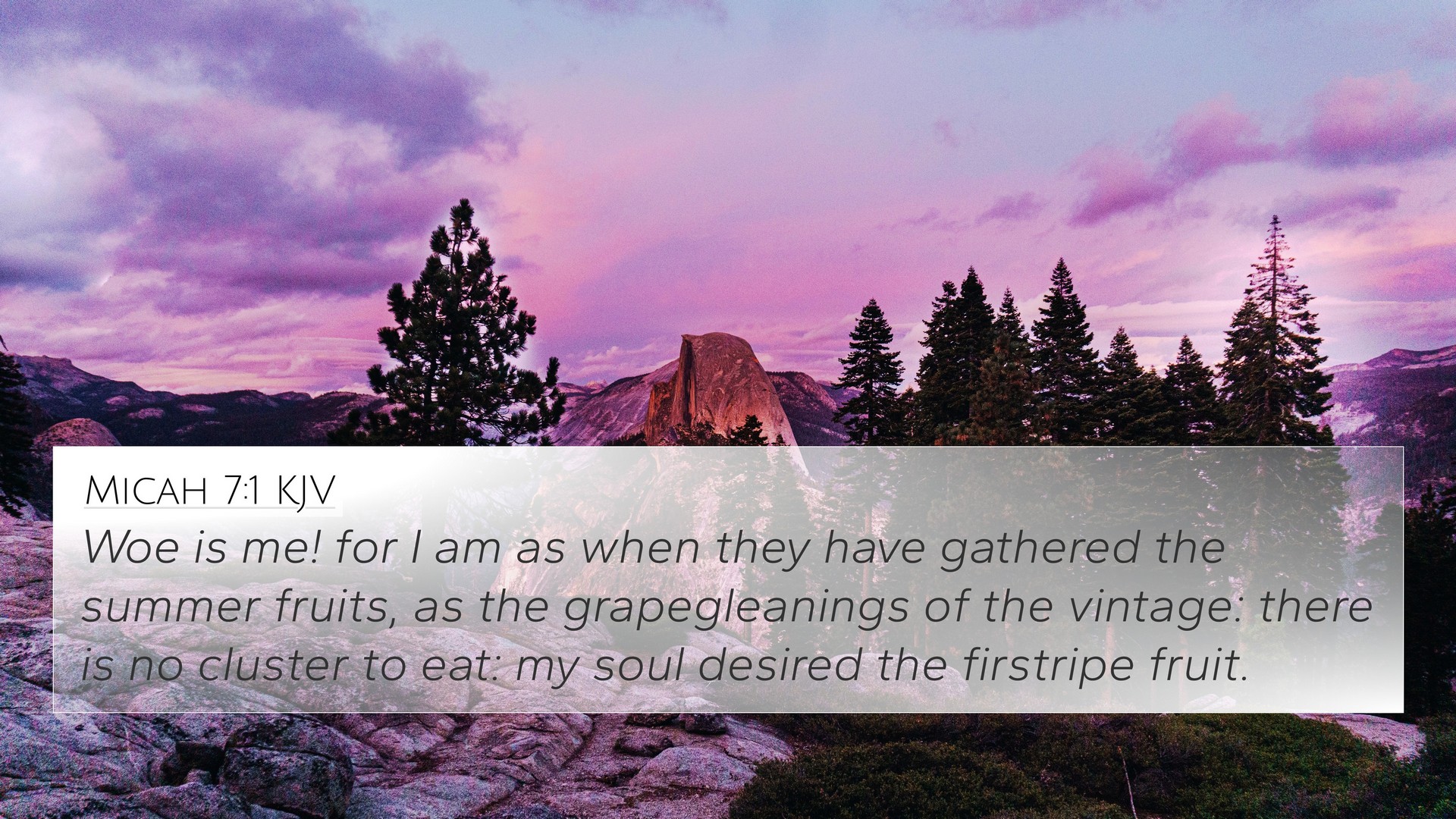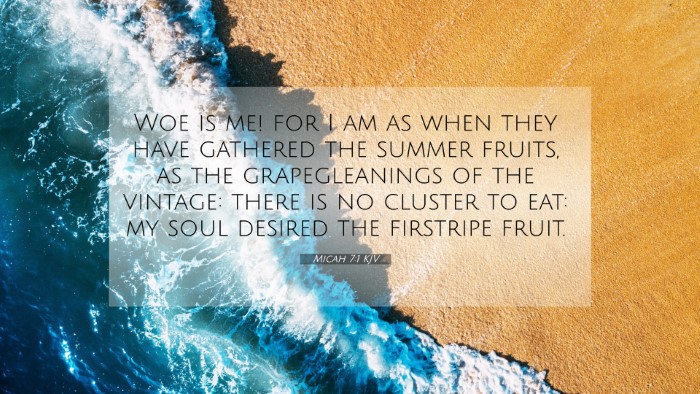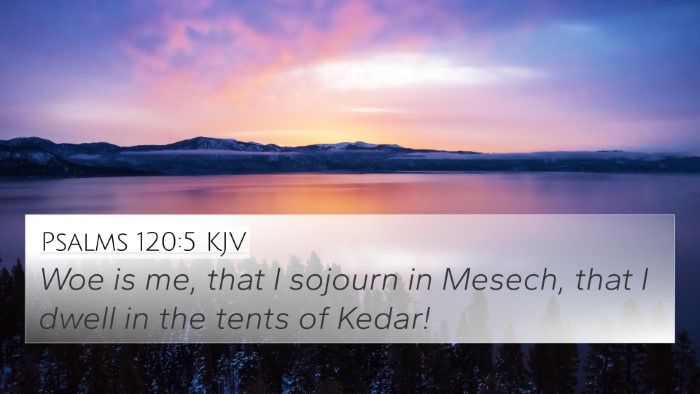Old Testament
Genesis Exodus Leviticus Numbers Deuteronomy Joshua Judges Ruth 1 Samuel 2 Samuel 1 Kings 2 Kings 1 Chronicles 2 Chronicles Ezra Nehemiah Esther Job Psalms Proverbs Ecclesiastes Song of Solomon Isaiah Jeremiah Lamentations Ezekiel Daniel Hosea Joel Amos Obadiah Jonah Micah Nahum Habakkuk Zephaniah Haggai Zechariah MalachiMicah 7:1 Similar Verses
Micah 7:1 Cross References
Woe is me! for I am as when they have gathered the summer fruits, as the grapegleanings of the vintage: there is no cluster to eat: my soul desired the firstripe fruit.
Uncover the Rich Themes and Topics of This Bible Verse
Listed below are the Bible themes associated with Micah 7:1. We invite you to explore each theme to gain deeper insights into the Scriptures.
Micah 7:1 Cross Reference Verses
This section features a detailed cross-reference designed to enrich your understanding of the Scriptures. Below, you will find carefully selected verses that echo the themes and teachings related to Micah 7:1 KJV. Click on any image to explore detailed analyses of related Bible verses and uncover deeper theological insights.
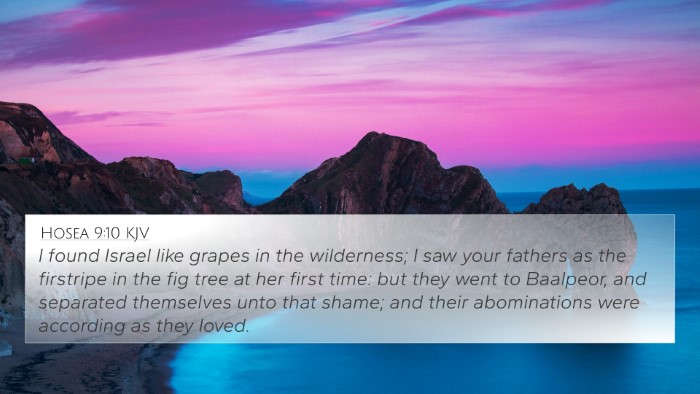
Hosea 9:10 (KJV) »
I found Israel like grapes in the wilderness; I saw your fathers as the firstripe in the fig tree at her first time: but they went to Baalpeor, and separated themselves unto that shame; and their abominations were according as they loved.
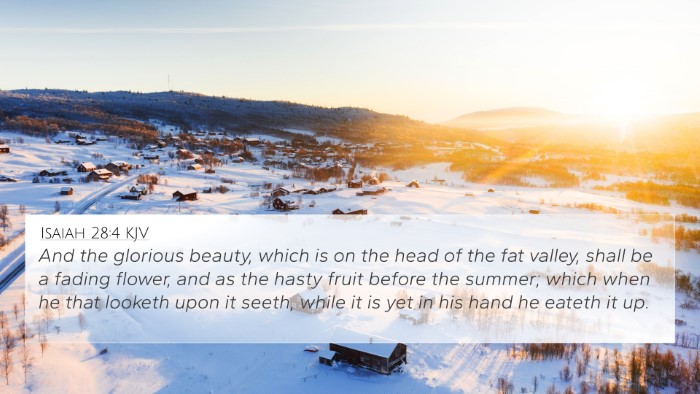
Isaiah 28:4 (KJV) »
And the glorious beauty, which is on the head of the fat valley, shall be a fading flower, and as the hasty fruit before the summer; which when he that looketh upon it seeth, while it is yet in his hand he eateth it up.
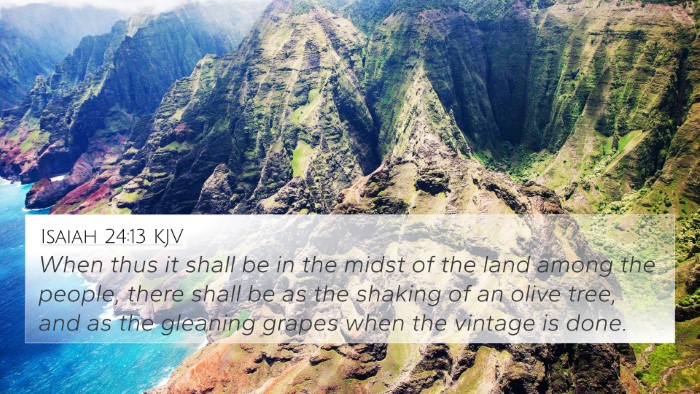
Isaiah 24:13 (KJV) »
When thus it shall be in the midst of the land among the people, there shall be as the shaking of an olive tree, and as the gleaning grapes when the vintage is done.
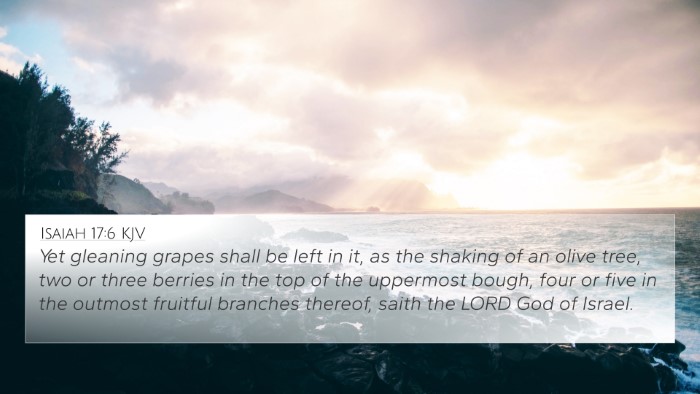
Isaiah 17:6 (KJV) »
Yet gleaning grapes shall be left in it, as the shaking of an olive tree, two or three berries in the top of the uppermost bough, four or five in the outmost fruitful branches thereof, saith the LORD God of Israel.
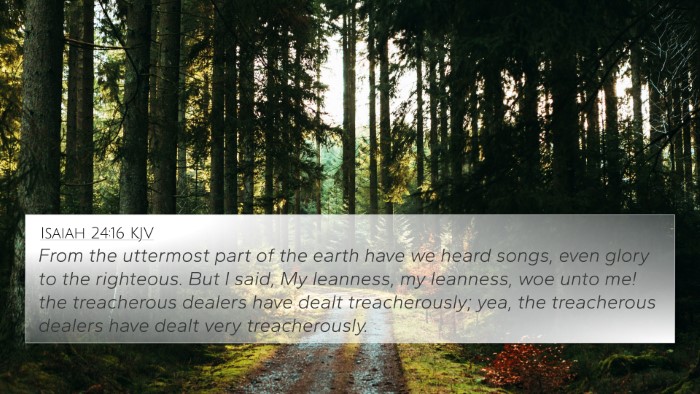
Isaiah 24:16 (KJV) »
From the uttermost part of the earth have we heard songs, even glory to the righteous. But I said, My leanness, my leanness, woe unto me! the treacherous dealers have dealt treacherously; yea, the treacherous dealers have dealt very treacherously.
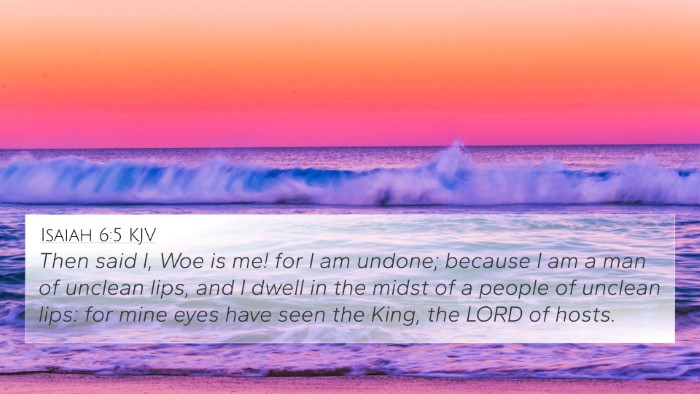
Isaiah 6:5 (KJV) »
Then said I, Woe is me! for I am undone; because I am a man of unclean lips, and I dwell in the midst of a people of unclean lips: for mine eyes have seen the King, the LORD of hosts.
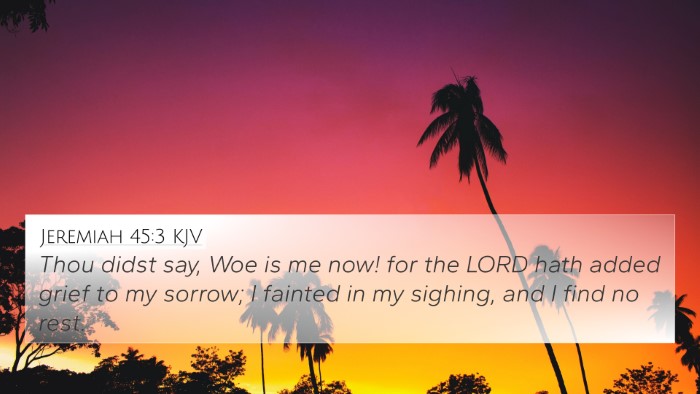
Jeremiah 45:3 (KJV) »
Thou didst say, Woe is me now! for the LORD hath added grief to my sorrow; I fainted in my sighing, and I find no rest.
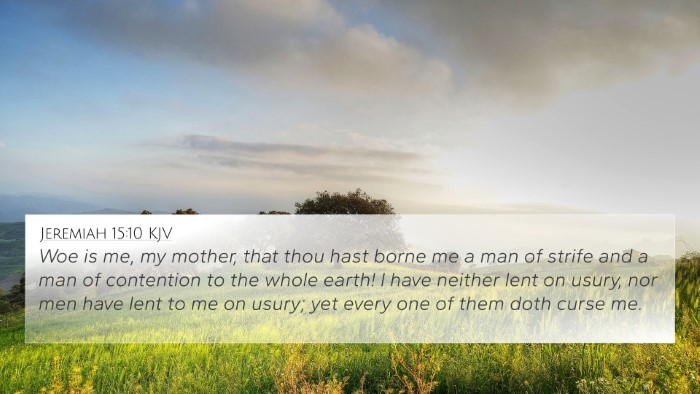
Jeremiah 15:10 (KJV) »
Woe is me, my mother, that thou hast borne me a man of strife and a man of contention to the whole earth! I have neither lent on usury, nor men have lent to me on usury; yet every one of them doth curse me.
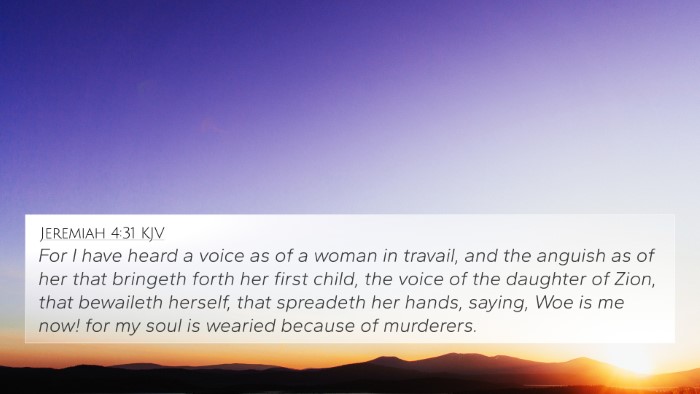
Jeremiah 4:31 (KJV) »
For I have heard a voice as of a woman in travail, and the anguish as of her that bringeth forth her first child, the voice of the daughter of Zion, that bewaileth herself, that spreadeth her hands, saying, Woe is me now! for my soul is wearied because of murderers.
Micah 7:1 Verse Analysis and Similar Verses
Understanding Micah 7:1
Verse Reference: Micah 7:1
“Woe is me! For I am as when they have gathered the summer fruits, as the grape gleanings of the vintage: there is no cluster to eat: my soul desired the firstripe fruit.”
Overview of Micah 7:1
This verse is a poignant expression of lament from the prophet Micah. It captures a sense of despair and desolation amidst a landscape of moral corruption and societal decay. To grasp the full depth of this verse, we turn to insights from various public domain commentaries.
Commentary Insights
-
Matthew Henry:
Henry describes the metaphor of fruit gathering as indicative of a lack of righteousness among God’s people. The imagery of gleanings highlights the futility and emptiness Micah feels, as he searches for the remnants of goodness in a corrupt society. He compares his situation to the late summer when fruit is scarce, portraying a time when spiritual nourishment is hard to find.
-
Albert Barnes:
Barnes notes that Micah is lamenting not only his personal desolation but the collective lostness of Israel. He interprets the "summer fruits" as a symbol of God's mercy and blessings that have been neglected. The lack of a "cluster" represents the absence of righteous people who could provide comfort and support.
-
Adam Clarke:
Clarke emphasizes the emotional turmoil Micah experiences. He feels like a fruit gatherer who, after a hard day’s work, finds nothing to harvest. Clarke explains that this metaphor illustrates a profound spiritual hunger and disillusionment in the face of sin, reinforcing Micah’s role as a prophet burdened with the sins of the people.
Bible Cross-References
To further understand Micah 7:1, we can explore various Bible verses that relate to its themes:
- Isaiah 24:13: Illustrates a similar theme of desolation amidst the land.
- Jeremiah 8:20: Describes the time of harvest and the lament of people who find no salvation.
- Lamentations 4:9: Gives insight into the sorrow of those who seek sustenance in a time of crisis.
- Matthew 9:36: Jesus expresses compassion for the lost, akin to the desolation Micah feels.
- John 15:5: Highlights the importance of remaining in Christ to bear fruit, which is the very essence Micah longs for.
- Galatians 5:22-23: Discusses the fruits of the Spirit, contrasting with Micah's search for any good in his society.
- Psalms 126:5-6: Speaks of reaping joy after sowing in tears, relating to the lament of Micah.
Thematic Bible Verse Connections
This lament in Micah 7:1 invites a comparative analysis of other Biblical texts that explore similar themes of longing for righteousness amid societal decay. The imagery of fruit and harvest can also be seen in the following ways:
- Fruit as a representation of righteousness – Psalm 1:3: “He shall be like a tree planted by the rivers of water, which brings forth its fruit in its season.”
- The idea of spiritual barrenness – Matthew 21:19: Jesus curses the barren fig tree, a symbol of unfruitfulness.
- The harvest metaphor reflects divine judgment and blessing – Revelation 14:15: “The harvest of the earth is ripe.”
Conclusion
The profound despair expressed in Micah 7:1 encapsulates the emotional burden of a prophet amidst a culture of moral failing. Through cross-referencing this verse with others, we deepen our understanding of its significance, finding parallels that enrich our study. The linkage between these scriptures not only enhances our comprehension of Micah's message but also provides a wider lens through which we can observe the continuity of God's call for righteousness and justice throughout the Scriptures.
